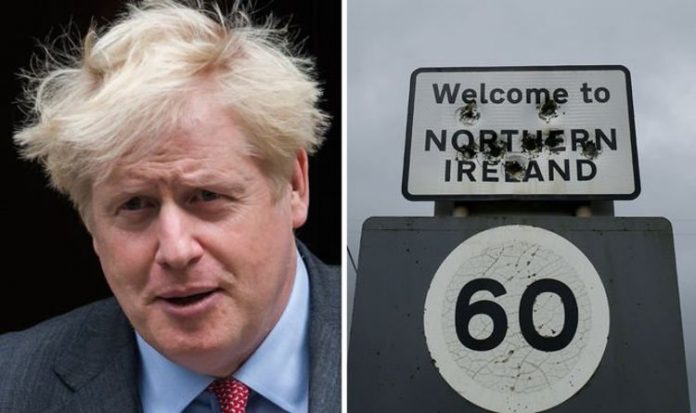When the transition period concludes at the end of this year checks will be required on some goods travelling between Northern Ireland and the rest of the UK under the terms of the Brexit Withdrawal Agreement. This is because unlike Great Britain Northern Ireland is set to remain closely tied to the European single market.
However according to Edwin Poots, the Stormont minister for agriculture, environment and rural affairs, these won’t be ready in time.
He claimed this is because of a dispute between the UK and EU over the IT system being used by the British.
Mr Poots said: “One of the issues that is outstanding relates to IT.
“There seems to be a bit of an issue between an IT system used in the UK for many years and the EU’s non-acceptance of that, which will almost certainly ensure that we are not operationally ready.”

Border checks at Northern Irish ports might not be ready for a no deal Brexit (Image: GETTY)

Boris Johnson is attempting to negotiate a new trade deal with the EU (Image: GETTY)
UK Environment Secretary George Eustice has written to Mr Poots department calling for swift action.
The Government recently introduced controversial legislation which could overrule the Brexit Withdrawal Agreement.
It argues the restrictions placed on Northern Ireland as a result of its continued tied to the European single market are an infringement of British sovereignty.
Earlier this month Cabinet Minister Brandon Lewis admitted the plans “break international law in a specific and limited way”.
READ MORE: Bill Cash warns Remainer parties of holding back Brexit Britain

Edwin Poots (centre) delivered the warning (Image: GETTY)
The move was condemned by a number of prominent figures including former Prime Minister Theresa May.
Currently the UK and EU are attempting to negotiate a new trade deal to come into effect when the transition period expires at the end of this year.
However, talks are deadlocked over EU access to British waters for fishing and how much state aid the UK can give private companies.
If a compromise isn’t reached tariffs will be imposed on many goods travelling between Britain and the EU from next year.
DON’T MISS
Brexit breakthrough: EU official admits ‘window of opportunity’ [INSIGHT]
Red Wall Tory MP blasts Starmer after plea to ex-Labour voters [REVEAL]
Furious French farmers pictured burning EU flags [SHOCK]

The UK has pledged to avoid any checks along the Northern Irish border (Image: GETTY)

The Good Friday Agreement ended the Northern Ireland conflict (Image: GETTY)
The Northern Ireland backstop, part of the withdrawal agreement, is designed to stop any hard border between Northern Ireland and the Irish Republic.
Brussels argues these would violate the 1998 Good Friday Agreement and threaten to reopen the conflict.
Mr Poots, a unionist politician, admitted he wanted to pause work on creating any checks between Northern Ireland and the rest of the UK after the Government announced it could overwrite parts of the Withdrawal Agreement.
However, he was informed by Mr Eustice’s office this would not be legally possible.
He explained: “I have no legal remit to stop it, in that all of the advice from the departmental solicitor’s office, and indeed the advice from the attorney general, would indicate that a ministerial direction to an official that would oblige an official to break the law is not a direction that would have any standing.”
Mr Poots is a member of the Democratic Unionist Party, which is fiercely opposed to any regulatory checks between Northern Ireland and other parts of the UK.
The Government argues under the terms of the withdrawal agreement food exports from Great Britain to Northern Ireland could be blocked if there is a no deal exit at the end of the year.
However former Prime Minister Sir John Major claimed altering the deal would damage Britain’s reputation for honesty.

Loyalists parading in Belfast last year (Image: GETTY)
He said: “For generations, Britain’s word – solemnly given – has been accepted by friend and foe.
“Our signature on any treaty or agreement has been sacrosanct.
“If we lose our reputation for honouring the promises we make, we will have lost something beyond price that may never be regained.”
Britain voted for Brexit in June 2016 and finally left the EU on January 31 of this year.







